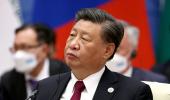Nepal witnessed political turbulence in 2022 that dramatically turned rivals into allies and throned former guerrilla leader Pushpa Kamal Dahal 'Prachanda' as the prime minister for a third time, as Kathmandu made efforts to balance ties with immediate neighbours India and China with high-profile talks and visits.

Prachanda, the 68-year-old Communist Party of Nepal-Maoist Centre chairman, surprisingly left his pre-poll alliance with the Nepali Congress and joined hands with rival Communist Party of Nepal-Unified Marxist–Leninist led by former premier K P Sharma Oli and five other smaller parties to become prime minister.
Elections to the lower house and seven provincial assemblies were held last month to end the prolonged political instability that had plagued the Himalayan nation.
However, the polls resulted in a hung parliament, with the Nepali Congress emerging as the single largest party, followed by CPN-UML and Prachanda's CPN-Maoist.
No party in the 275-member House of Representatives got 138 seats required to form a government.
The wheel turned full circle since Prachanda and Oli were allies till the former broke away last year and backed Nepali Congress president Sher Bahadur Deuba for the post of prime minister.
Not only did Oli succeed in getting Prachanda anointed as the prime minister, a move which weaned Prachanda away from the Congress-led alliance, but he also now gets to have his own candidate for the head of the state and the Speaker of the House of Representatives along with plum ministries and a majority of the provincial chief ministers.
The new alliance of the seven parties seems to be headed to form governments in all seven provinces.
The development may not bode well for India-Nepal ties as Prachanda and his main backer Oli have had some run-ins with New Delhi previously over territorial issues.
Both the communist leaders are known for their pro-China stance and it would be interesting to see how they maintain ties of equi-proximity with both neighbours.
In 2022, the India-Nepal ties took an upward swing with the two sides expanding cooperation in a range of key areas, including railway connectivity, the power sector and energy, signalling a major reset of bilateral relations that came under severe strain after the boundary row escalated in 2020.
Both Prime Ministers Narendra Modi and Deuba (now former) visited each other's country and held extensive talks covering various key facets of the close neighbourly ties.
The two high-level interactions moved the ties on an upward trajectory.
In a historic move to boost connectivity, Prime Minister Modi and his then Nepalese counterpart Deuba during the latter's visit to India in April inaugurated the first broad-gauge passenger railway service connecting Bihar's Jayanagar with Nepal's Kurtha region.
Modi and Deuba also launched a 90-km power transmission line and rolled out India's RuPay payment card in Nepal.
They discussed the boundary issues and the two leaders agreed to address such issues through the existing mechanism and through holding dialogue and diplomacy.
Nepal shares a border of over 1,850-km with five Indian states -- Sikkim, West Bengal, Bihar, Uttar Pradesh and Uttarakhand.
The two countries released a vision document for deepening cooperation in the power sector and inked four pacts providing for cooperation in the areas of energy and railways.
India and Nepal also agreed on cooperation in education, health, energy, trade and cross-border transmission lines, enhancing cross-border connectivity through railway line construction, construction of integrated check post and dry ports and promoting bilateral trade.
In May, Modi, at the invitation of Deuba, paid a day-long visit to Lumbini, Lord Buddha's birthplace, on the occasion of Buddha Purnima and offered prayers at the sacred Maya Devi temple in Nepal. During the visit, the two sides inked key MoUs to diversify and deepen cooperation.
Modi assured India's support in the development of Nepal's hydropower sector and in encouraging Indian developers to expeditiously explore new projects in the country.
Nepal is important for India in the context of its overall strategic interests in the region, and the leaders of the two countries have often noted the age-old 'Roti Beti' relationship.
Land-locked Nepal relies heavily on India for the transportation of goods and services.
Ties between the two countries came under severe strain after Kathmandu published a new political map in 2020 that showed the three Indian territories -- Limpiyadhura, Kalapani and Lipulekh -- as part of Nepal.
The then Prime Minister Oli attempted to use the issue to fend off increasing domestic pressure and challenge his leadership.
At the end of the year 2022, Nepal and India also agreed to let the Mahakali river flow in its original course during the Border Coordination Meeting at Dharchula.
The year 2022 also saw Nepal and the US marking 75 years of their diplomatic relations and the Nepalese Parliament approving a contentious USD 500 million US government aid programme -- Millennium Challenge Corporation (MCC), despite domestic political divisions and objections from China.
China, which is in a tussle with the US for influence in the Himalayan nation, in a sharp reaction said that Washington should not undermine the sovereignty of other countries through 'coercive diplomacy'.
China is stepping up its forays into Nepal through various infrastructure ventures, including the trans-Himalayan connectivity projects, under Beijing's ambitious Belt and Road Initiative (BRI).
Beijing has signed the BRI framework agreement with Nepal which envisages trans-Himalayan electric transmission lines and a railway network between Nepal and China.
Chinese concerns in Nepal have heightened due to increasing US influence.
In September, Nepal hosted Li Zhanshu, the head of China's legislature and the third-ranked leader in the country's political hierarchy, who held talks with top political leaders, including Oli and 'Prachanda' and discussed bilateral ties and other issues of mutual interest.
Li, Chairman of the Standing Committee of the National People's Congress -- China's Parliament, also exchanged views with the Nepalese leaders on the importance of implementing connectivity infrastructures, including under the BRI, an ambitious initiative from Chinese President Xi Jinping.










